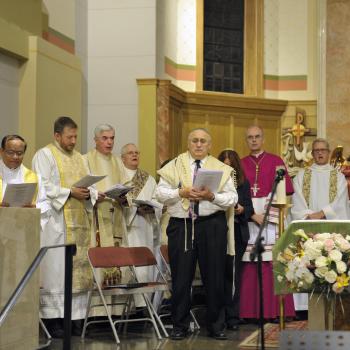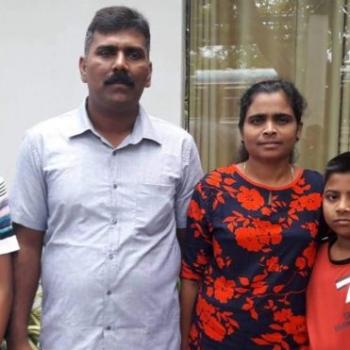As we celebrate Mass this evening, we mark the end of our observance of All Souls Day and the beginning of the month when we remember all the faithful departed. It is a period of prayerful remembrance.
The Gospel this weekend has something to tell us about remembrance — about not forgetting someone, about looking for those who are overlooked, finding someone who is lost.
Thinking of those in my own life, people I’d neglected or forgotten about, brought back a memory.
Several weeks ago, my sister sent me some old photographs she’d uncovered. They were from 1983: pictures of my parents during their last visit to my father’s hometown, Taylor, Pennsylvania. As part of the trip, they stopped by the local churchyard, where many of my father’s family are buried.
One of the photographs showed the gravestone of a woman whose story I had often heard, but whose name I never knew until recently.
Maria Kandra.
From what I know of her, Maria came to this country as a young girl in the early 1900s from a village called Margecany, in what was then Austria-Hungary. Today, it is Slovakia. Maria settled with her family in Taylor, Pennsylvania, outside Scranton. She married a boy from her village, George Kandra. These were humble people. I don’t think he even graduated from high school. He worked, like many of the immigrants in the town, in the coal mines. George and Maria soon had a young daughter whom they named Mary.
But George and Maria’s life together was over before it had even begun.
Not long after her daughter was born, a flu epidemic swept through the country. The poor were hit especially hard. And one of those who died in the epidemic was Maria.
She was 23. She left behind her husband, who was 24, and her infant daughter.
Her husband remarried a short time later to another young Slovak girl from his homeland. They went on to have four more children. One of them was my father.
But during this month of remembrance, I am remembering someone who has been largely forgotten. Maria Kandra. We have no photographs of her. No one to tell her story. But I am haunted by the memory of that young girl who came to a strange place to start a new life — a life that was far too brief but a life that, indirectly, has touched my own.
In the various branches of my family tree, she’s someone who is overlooked. This month, I’m making her my personal prayer intention — to pray for this soul and to ask her to pray for me.
Like the central figure of today’s Gospel, Zacchaeus, she is someone who might easily be missed. Neglected. Overlooked.
But this Gospel is a reminder: Jesus never overlooked anyone.
Again and again, he sought out those figures most people had given up on. The lame, the blind, the poor, the lepers. The small. The weak. Notorious sinners. The men and women others treated as trash — people to be mocked, or avoided, or stoned to death.
And he pointed to them and I said, as I said to Zacchaeus, “I’m staying with you.”
He said it to Zacchaeus, and he says it today to all of us. Christ came to stay with people like us: simple sinners who are struggling to see him. He came to dwell with us in our weakness, our sinfulness, our humanity — and he came to change us. As the final words of the Gospel tell us:
“The Son of Man has come to seek and to save what was lost.”
The message is clear. No one is insignificant in the eyes of God.
Jesus affirms that. And his presence with us even now in the Eucharist offers us tangible proof.
“I’m staying with you.”
Remember that. Never take that for granted.
We are remembered, even as we are called to remember — and not just during this month.
The sacrament we celebrate here is a sacrament created with these simple words: “Do this in memory of me.”
They were spoken by one who will never forget us, never abandon us, never overlook us.
As our Lord remembers us, we need to remember him. His teachings. His miracles. His mercy.
His example.
And that can begin during this sacred month with remembering those we love, those we have lost — but also remembering and praying for those we don’t even know.
Every year on All Souls Day, Msgr. Funaro used to pray at this altar for those souls in purgatory who have no one to pray for them.
This month, if you do nothing else, offer a pray for them.
Souls like Maria Kandra. Our family. Our ancestors. Even those we never knew but made our lives of faith possible.
Every one of us has someone like that.
This month, pray for that soul. And ask that person to pray for you.
We don’t like to think about it, but one day, that person could be us.
So pray for the forgotten souls. Those who died alone. Those who died poor.
Pray, even, for those who are disliked. The ones who are gossiped about. Those who are belittled.
Pray for the Zacchaeuses of the world.
We may all feel, at one time or another, like Zacchaeus, someone who could be lost in a crowd or — in every sense — looked down on.
Some of us may feel that way in the eyes of others.
But we are never that way in the eyes of God.
The beautiful words of the Book of Wisdom this weekend are words each of us needs to take to heart and carry with us in prayer:
“Before the Lord, the whole universe is as a grain from a balance or a drop of morning dew come down upon the earth.
But you have mercy on all, because you can do all things; and you overlook people’s sins that they may repent.
For you love all things that are.”
May the souls of the faithful departed, through the mercy of God, rest in peace.













